
Chile is a predominantly Christian country, with adherents of Islam being a minuscule minority. Due to the secular nature of Chile's constitution, Muslims are free to proselytize and build places of worship in the country. The statistics for Islam in Chile estimate a total Muslim population of approximately 5,000, representing less than 0.02% of the population. There are a number of Islamic organizations in Chile, including the Muslim Society of Chile and As-Salam Mosque in Santiago, Bilal Mosque in Iquique, the Mohammed VI Cultural Center in Coquimbo, and Islamic Foundation of Chile in Santiago.

The history of Islam in Iraq goes back almost 1,400 years to the lifetime of Muhammad. Iraq's 98% majority Muslims follow two distinct traditions: Shia Islam (55-60%) and Sunni Islam (35-40%).
Seven Oaks is an unincorporated community in Anne Arundel County, Maryland, United States. Though it is included in the census-designated place of Odenton, it lies across from Fort Meade and the NSA, and is more a part of those communities. It covers more than 725 acres (2.93 km2) of land, and development began in 1987.
O'Donnell Heights is a neighborhood named for a public housing development in the far southeastern part of the city of Baltimore, Maryland, United States. It is located south and east of Interstate 95, just west of the border with Baltimore County, and north of the St. Helena neighborhood.

The Baltimore–Columbia–Towson Metropolitan Statistical Area, also known as Central Maryland, is a metropolitan statistical area (MSA) in Maryland as defined by the United States Office of Management and Budget (OMB). It is part of the larger Washington–Baltimore combined statistical area. As of 2022, the combined population of the seven counties is 2,985,871, making it the 20th-largest metropolitan statistical area in the nation.
The Johns Hopkins School of Education is the school of education of Johns Hopkins University, a private research university in Baltimore, Maryland, United States. Established as a separate school in 2007, its origins can be traced back to the 1909 Founding of Johns Hopkins's College Courses for Teachers, later renamed College for Teachers.
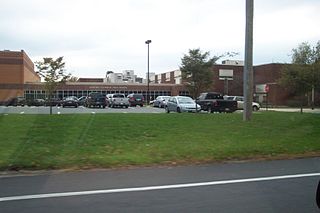
Harford Technical High School (HTHS) is a four-year technical public high school in Bel Air in Harford County, Maryland, United States. The school, located near the center of the county, is across the street from Harford Community College and next to the Harford Academy.
Mondawmin Mall is a three-level shopping mall in West Baltimore, Maryland, United States. The mall was a development of the Mondawmin Corporation, a firm set up in 1952 by James Rouse and Hunter Moss under the Moss-Rouse Company. When it first opened in October 1956, it had an open-air plan and was called the Mondawmin Center. It was later enclosed and renamed the Mondawmin Mall.
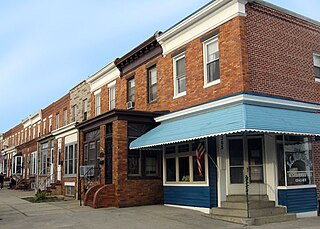
Joseph Lee, the residential part of Bayview, is a neighborhood in Baltimore, Maryland, United States. Part of the larger Bayview or Hopkins Bayview neighborhood, it borders the Greektown neighborhood. It is sometimes called the "A to K" or "ABC neighborhood" because its north-south streets are arranged in alphabetical order: Anglesea, Bonsal, Cornwall, Drew, Elrino, Folcroft, Gusryan, Hornel, Imla, Joplin, and Kane.

Maryland House of Delegates District 43 is one of 47 legislative districts in the state of Maryland and one of the 5 located entirely within Baltimore City. The neighborhoods of Abell, Cedarcroft, Charles Village, Coldstream-Homestead-Montebello, Ednor Gardens-Lakeside, Guilford, Homeland, Hillen, Lake Evesham, Lauraville, Mid-Govans, Northwood, Pen Lucy, Radnor-Winston, Ramblewood, Stonewood-Pentwood-Winston, Tuscany-Canterbury, Waverly, Wilson Park and Woodbourne Heights, Baltimore make up the majority of the district. The district is divided into two sub-districts for the Maryland House of Delegates: District 43A and District 43B.
The American Society of Muslims was a predominantly African-American association of Muslims which was the direct descendant of the original Nation of Islam. It was created by Warith Deen Mohammed after he assumed leadership of the Nation of Islam upon the death of his father Elijah Muhammad. Warith Deen Mohammed changed the name of the Nation of Islam to the "World Community of Islam in the West" in 1976, then the "American Muslim Mission" in 1981, and finally the "American Society of Muslims" in 1988.

The Islamic Cultural Center of New York is a mosque and an Islamic cultural center in East Harlem, Manhattan, New York City, United States. It is located at 1711 Third Avenue, between East 96th and 97th Streets. The Islamic Cultural Center was the first purpose-built mosque in New York and continues to be one of the city's largest. The mosque's older dwelling in a townhouse at 1 Riverside Drive is still in continual prayer use as a satellite location.
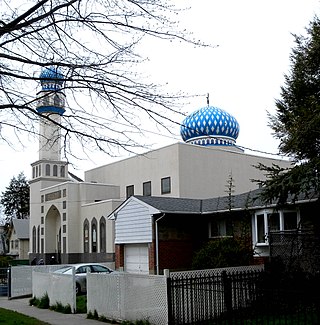
Masjidi Hazrati Abu Bakr Siddique is a mosque in Flushing, Queens, New York, United States. It is located at 141-47 33rd Avenue.

The Mosque Foundation is located in Bridgeview, Illinois, in the Chicago metropolitan area.
Lexington is a neighborhood in Baltimore, Maryland, United States. It is bordered by West Mulberry St to the north, West Baltimore St to the south, Monroe St to the east, and Warwick Ave to the west. The neighborhood consists primarily of rowhouses. It also encompasses Grace Medical Center, Bentalou Elementary School and Bentalou Recreation Center.
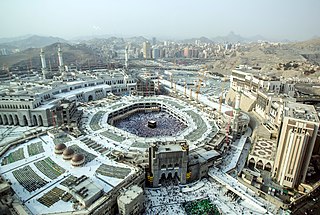
Masjid al-Haram, also known as the Sacred Mosque or the Great Mosque of Mecca, is considered to be the most significant mosque in Islam. It encloses the vicinity of the Kaaba in Mecca, in the Mecca Province of Saudi Arabia. It is among the pilgrimage sites associated with the Hajj, which every Muslim must perform at least once in their lives if able. It is also the main site for the performance of ʿUmrah, the lesser pilgrimage that can be undertaken any time of the year. The rites of both pilgrimages include circumambulating the Kaaba within the mosque. The Great Mosque includes other important significant sites, such as the Black Stone, the Zamzam Well, Maqam Ibrahim, and the hills of Safa and Marwa.
Jonestown is an unincorporated community in Howard County, Maryland, United States.
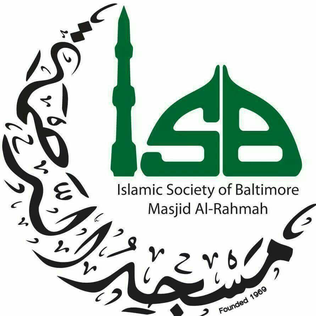
The Islamic Society of Baltimore (ISB) is a Muslim community center located in Catonsville, Baltimore County, Maryland, consisting of Masjid Al-Rahmah, Al-Rahmah School, and several other services. The society was founded in 1969 by three Muslim physicians and is known for then-President Barack Obama's visit on February 3, 2016. As of 2019, the society serves around 3,000 people.
There is a notable population of American Muslims in the Dallas–Fort Worth metroplex. Dallas-Fort Worth is home to sixty-two Sunni mosques and five Shia mosques. According to Abdel Rahman Murphy, a Chicago-born, Irving-based Islamic teacher and Muslim community leader, other U.S.-based Muslims now refer to Dallas as the "Medina of America". Not only is Dallas Masjid Al Islam the oldest Muslim community in the DFW area, it established the first mosque in the city of Dallas and established the first Muslim school in the DFW area. As of 2021, many major Muslim organizations and charities have headquarters or operations in DFW, mostly located in Richardson, Texas such as: ICNA Dallas, Muslim American Society, Muslim Legal Fund of America, Helping Hands for Relief & Development, Sabrina Memorial Foundation, Islamic Relief USA, CAIR-Texas, and MA’RUF. There are also several institutions of research and higher education such as: Qalam Institute (Carrollton), ISRA Foundation (Plano), Bayyina Academy (Euless), and The Islamic Seminary of America (Richardson). -

There are around 70,000 Muslims in Maryland in the United States as of December 1992, according to the American Muslim Council. This is the tenth highest number of Muslims of all U.S. states, representing 1.4% of the Muslim population in the country, as well as 1.4% of the total population of Maryland, at the time of the report.











